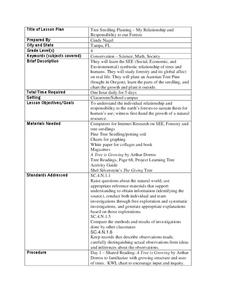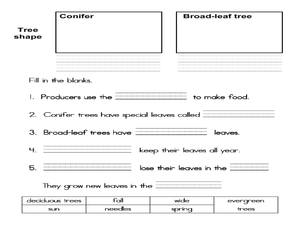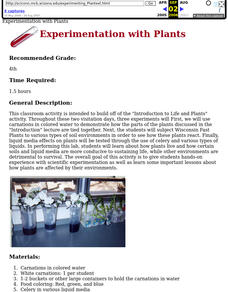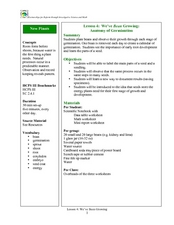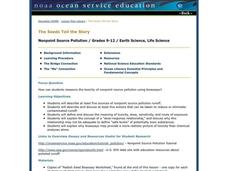Curated OER
Crops 2: What Plants Need to Grow
Students explore agriculture by participating in a plant growth activity. In this botany lesson, students discuss what types of plants grow in their local environment and what the plants need to survive. Students read assigned text about...
Curated OER
POLLINATION DEMONSTRATION
Third graders study the terms pollen and pollination. They use appropriate vocabulary in describing their investigations, explorations, and observations (e.g., stem, pistil, stamen, flower). They describe, using their observations,...
Curated OER
Tree Seedling Planting- My Relationship and Responsibility to our Forests
In this trees lesson plan, 4th graders read the book, A Tree is Growing and complete a KWL chart on how trees grow and how they are used. Students research the symbiotic relationship of humans and trees, create tree collages, plant a...
Curated OER
Producers -- Focus on Trees
Students examine the needs of trees and plants. In this forest ecosystem lesson students use seedlings to investigate the basic necessities of plants. They discuss the consequences of these basic needs not being met.
Curated OER
Relationships and Biodiversity Lab
In this relationships and biodiversity worksheet, students investigate the relationships between 4 plants sample using 7 different tests. These include looking at structural characteristics of the plants, seeds and stems, using paper...
Curated OER
Voyage of Discovery
Students develop a sense of the scale of our solar system by creating a one to ten billion scale model. They calculate the relative sizes and distances for the planets and asteroid belt using a guiding worksheet. To create the model they...
Curated OER
Function of a Stem
Fourth graders perform an experiment to test the function of a stem. In this science activity, 4th graders write a description of their investigations. Students also explain how the stem interacts with the rest of the plant. Students use...
Curated OER
What About Cantaloupes?
Second graders investigate the physical properties of cantaloupe using their senses. In this life science activity, 2nd graders estimate the weight of their sample. They get it's actual weight and compare it with their estimate.
Curated OER
Lesson 12: Ho'olaulima: Let's Make a Hawaiian Garden
Second graders grow a classroom garden that acts as a living laboratory for cross-curricular activities. In this classroom garden lesson, 2nd graders follow directions to build and plant a garden that is used to teach math, science, and...
Curated OER
This Can't be a Plant
Learners grow mold. In this science experiment lesson, students grow mold on different pieces of bread by adjusting the moisture, temperature, and light. They record the results to see which grows the most mold.
Curated OER
Simple Plants Concept Map
In this plant science activity, students complete a concept map on the classification of plants. They fill in 9 blanks with the correct words from the list.
Curated OER
Can Photosynthesis Occur at Saturn?
Students identify the different requirements for photosynthesis to take place. In this space science instructional activity, students simulate conditions in Saturn to investigate if photosynthesis is possible there. They use data and...
Curated OER
Experimentation With Plants
Fourth graders experiment with different varieties of plants and draw conclusions after performing a series of lab activities. A very helpful student worksheet is given. This is a nicely done introductory lesson plan for life science.
Curated OER
Living or Non-Living
Students examine living and non-living things. In this life science instructional activity, students are given a group of objects and discuss if they are living or non-living. Students identify and list characteristics of living things.
Curated OER
Great Balls of Fire
Sixth graders compare and contrast natural and synthetic fabrics. In this science investigation lesson, 6th graders test the flammability of 6 natural and synthetic fabrics.
Curated OER
Plants
Really only five slides of information, this resource is an outline on planting field crops. From it, aspiring agriculturists are exposed to different seeding methods: drilling, row crop planting, broadcast seeding, and air seeding. This...
Curated OER
We’ve Bean Growing: Anatomy of Germination
Students identify the main parts of a seed. In this biology lesson, students explain the factors needed for the seed to grow. They record observations everyday and report findings to class.
Curated OER
Pumpkin Talk
A pumpkin and a candle are all you need to help teach your students about what keep a flame going, and what factors lead to its going out. A lot of rich discussion should result from this fun activity. A great addition to a science...
Curated OER
Mountains
Explore the mountain habitat with this collection of slides. The climate is described, along with the associated plant and animal life. Some of the pictures are attractive, but some leave much to be desired. There is a generous amount of...
Curated OER
From One Seed Grow Many Seeds
First graders practice identifying plants by singing a song. In this plant life instructional activity, 1st graders sing the song "Parts of a Plant" which is based on the anatomy of sunflowers. Students discover agriculture techniques...
Curated OER
Flowers, Pods, and Seeds
Students gain an understanding of living organisms. the complete a plant growth data log to chart plant growth and to make observations, predictions, and personal reflections.
Curated OER
Growing Tomatoes from Seed
In this growing tomatoes worksheet, learners experience and participate in the process of growing tomatoes over a three or four month span of time. Students follow six directives in producing tomato plants.
Curated OER
A Seed for All Needs
Students identify uses for plants. In this agricultural lesson, students read the book Spring Gardening and distinguish between food plants and flowers. Students plant flower in cups as a follow-up activity.
Curated OER
The Seeds Tell the Story
Pupils explore sources of pollution runoff and actions that can be taken to reduce runoff. In this pollution lesson students complete a worksheet and see why bio-essays may provide a more realistic picture of toxicity.




